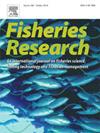Institutional context and methods of knowledge mobilization: The case of Marine Stewardship Council (MSC) – Certified fishery of Lagonoy Gulf, Bicol Region, Philippines
IF 2.3
2区 农林科学
Q2 FISHERIES
引用次数: 0
Abstract
Knowledge mobilization is a key issue in fisheries governance and an instrument to leverage effective governance. There exists a significant research gap about how a certified fishery supports knowledge mobilization in the Philippines. To answer this gap, this study was tailored to investigate the relevance of knowledge mobilization in the context of Marine Stewardship Council (MSC)-certified fishery based in Lagonoy Gulf, Philippines. Specifically, this study was carried out to: analyze the institutional context of MSC-certified fishery based in Lagonoy Gulf; examine the level of awareness of small-scale fishers with respect to MSC certification program; determine whether the MSC certification program has facilitated the taking of adaptation pathways among small-scale fishers; and identify the most preferred method of knowledge mobilization among small-scale fishers. Data were collected through key-informant interviews, subject interviews, focus-group discussions and participant observation. Interview transcripts were uploaded to NVivo platform for data collation and were inputted to the Voyant tools for discourse analysis. Results of this study revealed that fisheries governance in Lagonoy Gulf is immersed in fragmented collaborative governance where hierarchical, market-based and participatory governance modes converge. Majority of small-scale fishers of Lagonoy Gulf were unfamiliar about MSC certification as a market-based program. MSC fisheries certification missed the opportunity to facilitate the fishers to take on adaptation pathways to deal with climate change and other stressors. To promote knowledge mobilization, ‘incentivized community meetings and seminars’ were identified as effective motivators. The limited understanding of fishers regarding MSC certification highlights a failure in knowledge mobilization.
制度背景和知识动员的方法:海洋管理委员会(MSC)案例-菲律宾比科尔地区Lagonoy湾的认证渔业
知识动员是渔业治理的一个关键问题,也是利用有效治理的一个工具。关于获得认证的渔业如何支持菲律宾的知识动员,存在着重大的研究差距。为了弥补这一差距,本研究专门调查了菲律宾拉古诺湾海洋管理委员会(MSC)认证渔业背景下知识动员的相关性。具体而言,本研究的目的是:分析拉贡诺伊湾msc认证渔业的制度背景;检查小规模渔民对MSC认证计划的认识水平;确定MSC认证计划是否促进了小规模渔民采取适应途径;并确定在小规模渔民中最优选的知识动员方法。通过关键信息提供者访谈、受试者访谈、焦点小组讨论和参与者观察收集数据。访谈记录上传到NVivo平台进行数据整理,并输入Voyant工具进行话语分析。研究结果表明,拉贡诺湾的渔业治理处于碎片化的协同治理模式,分层、市场化和参与式治理模式相互融合。拉古诺湾的大多数小规模渔民并不熟悉MSC认证这一市场化项目。MSC渔业认证错过了帮助渔民采取适应途径来应对气候变化和其他压力的机会。为了促进知识动员,“激励性社区会议和研讨会”被确定为有效的激励因素。渔民对MSC认证的有限理解凸显了知识动员的失败。
本文章由计算机程序翻译,如有差异,请以英文原文为准。
求助全文
约1分钟内获得全文
求助全文
来源期刊

Fisheries Research
农林科学-渔业
CiteScore
4.50
自引率
16.70%
发文量
294
审稿时长
15 weeks
期刊介绍:
This journal provides an international forum for the publication of papers in the areas of fisheries science, fishing technology, fisheries management and relevant socio-economics. The scope covers fisheries in salt, brackish and freshwater systems, and all aspects of associated ecology, environmental aspects of fisheries, and economics. Both theoretical and practical papers are acceptable, including laboratory and field experimental studies relevant to fisheries. Papers on the conservation of exploitable living resources are welcome. Review and Viewpoint articles are also published. As the specified areas inevitably impinge on and interrelate with each other, the approach of the journal is multidisciplinary, and authors are encouraged to emphasise the relevance of their own work to that of other disciplines. The journal is intended for fisheries scientists, biological oceanographers, gear technologists, economists, managers, administrators, policy makers and legislators.
 求助内容:
求助内容: 应助结果提醒方式:
应助结果提醒方式:


